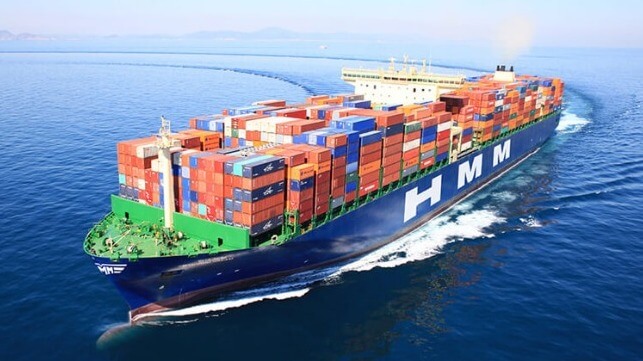HMM to Test Carbon Capture in Broader Energy Efficiency Plan

HMM is proceeding with the next phase of research into the use of carbon capture after reporting success with the first phase of its empirical research project on the emerging technology. The Korean shipping company becomes one of the first to proceed forward with testing of carbon capture for its vessels as part of a broader effort to respond to the strengthened environmental regulations and achieve the company’s goal to be carbon neutral by 2050.
HMM in September 2022 announced it was partnering with Panasia, a Korea-based marine parts manufacturer, to study onboard carbon capture systems. Under the terms of the agreement, HMM and Panasia conducted a feasibility study along with an economic analysis and risk assessment. In the first phase of the project, they were also exploring the handling process for captured CO2. The expectation was based on the results of the first phase they would proceed to install a carbon capture system and perform an operational test on its vessels.
Working with Samsung Heavy Industries and Panasia, they plan to proceed with the next phase of the research in the second half of 2023. HMM reports that the initial research confirmed that a carbon capture system could be installed without changing the existing equipment of the ship and that it would not hinder the vessel’s operations. They plan to liquefy the collected carbon in a pressurized tank. It will be offloaded from the ship where HMM points out it can be used in a variety of applications such as in farming or the manufacture of dry ice.
HMM will be responsible for the operation of the carbon capture system. Panasia and Samsung Heavy Industries will provide engineering support for the test.
HMM points out that it is part of the company’s broader efforts to respond to the strengthening of environmental regulations including the introduction of the CII rating system (Carbon Intensity Indicator) implemented by the IMO.
Starting in 2024, HMM also plans to replace the propellers on six of its containerships with a more efficient design specifically for slow steaming. They expect to achieve an 8 to 9 percent increase in energy efficiency through these changes. Six ships are initially targeted and the company reports it plans to expand the number of ships to comply with the CII regulations sequentially from 2024.
The shipping line formed a dedicated task force in 2015 focusing on energy efficient management and opened its Fleet Control Center in 2020, which analyzes data about vessel operations to improve efficiency and reduce emissions. According to HMM, the CO2 emissions generated when transporting 1 TEU for 1 km decreased from 68.7g in 2010 to 29.05g in 2021, representing a reduction of 57.7 percent over the last decade.

that matters most
Get the latest maritime news delivered to your inbox daily.
Among the other efforts the company has tested is the expanded use of biofuel drop-ins. Starting in November 2021, the Hyundai Dream (146,000 dwt) was refueled with a blend of biofuel and Very Low Sulfur Fuel Oil. The vessel tested the blend during 10 days of operation in the Pacific.
Several shipping companies have been moving forward with pioneering tests for onboard carbon capture. Japan’s K Line, working with Mitsubishi Shipbuilding installed a small-scale CO2 capture plant aboard a bulk carrier for the first onboard tests of a demonstration system in 2021. Other companies are working on technology designs and in February 2023, Eastern Pacific Shipping reported it had completed the installation of a filtering and carbon capture technology aboard one of the tankers it manages. Carbon capture is seen as a promising technology to help the maritime industry address the need to decarbonize the operations of its in-service fleet.
